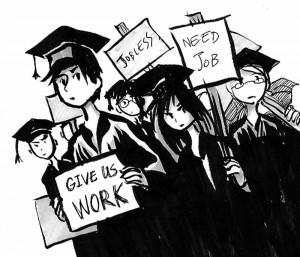US could learn from 15-M youth
2011 has been the year of protest. News reports, photos, videos, blog posts and conversations on the revolutions in the Middle East — Egypt, Libya, Syria, Tunisia — dominated the world’s airwaves this year, but, they were not the only revolutions taking place.
Spurred by economic crisis and anti-government sentiment, the 15-M youth protest movement was born in Spain in early 2011 and has since swept all of Europe. 15-M stands for May 15, the day the movement’s first protest was held under its defining motto: “Europe for citizens and not for the markets: We are not goods in the hands of politicians and bankers.”
We have much to learn from the energy, tenacity and powerful spirit of the 15-M youth movement.
Spanish youth, from 15 to 24, currently face an unemployment rate of around 40-45 percent, the highest in Europe. They are distrustful and doubtful of their political leaders. They are highly educated and motivated, yet overqualified for the low-level jobs available in a suffering economy. Their unemployment leaves them without true financial and personal independence and projects an image of apathetic disinterest.
Although the American youth’s economic situation is not as desperate as Spain’s, we are facing a very similar situation with an uncertain future brought on by economic crisis.
Spain and the United States have fallen on hard economic times, with every generation feeling the impact in some form.
For American college students, the recession has prompted many unanswered questions. How will we pay back our student loans? Can our family support four remaining years at school, especially somewhere as expensive as USC? Will there be jobs available for us in six months, one year or even two after we graduate?
Both countries suffer from a disconnect between government and people. In Spain, young people feel their political leaders’ priorities do not line up with their own. In the United States, as a result of the increasingly polarized political climate, Americans of every age have become disillusioned with and distrustful of our leaders.
Many of the 15-M protesters have graduated from university and are dealing with these problems not through apathy or brute force (as some politicians and members of older generations like to think), but with organized and spirited protest.
The youth have taken to the streets. Hundreds of people in Madrid spent the majority of the summer camped out in the physical and symbolic center of the city, Puerta del Sol, as a stage for their desperate call for social and political change. 15-M has a website, complete with a manifesto that demands unity, democracy and protection of inalienable rights and rejects any political affiliation. Much of the movement has been driven, organized and unified by this website, along with Twitter, Facebook and local blogs.
There’s something undeniably exciting and empowering about so many young people joining together in protest.
Again, we’re fortunate that the United States youth unemployment rate (about 17.4 percent) is much lower than Spain’s, but as future members of a stagnant job market, we face a similarly problematic future.
But young people across the world have refused to take these problems lying down. They have made themselves heard.
There might not be much we can do about the economic crisis or bipartisanship in government, but what we can do is continue our education and find ways to stay active and interested.
Spanish youth might be jobless, but they are educated. They know how to organize, to unify and to protest.
Granted, we’re not at the same breaking point of protest, but we should also have the same skills.
You don’t need to pitch a tent for months in McCarthy Quad or Downtown Los Angeles to be heard, but get involved in something you’re interested in where you can find your voice.
Join a club, volunteer for a political candidate’s upcoming campaign, apply to write for the newspaper. Chances are, being proactive now, even on the smallest level, could be the thing to secure you a job further down the line.
In an increasingly polarized and challenging social, political and economic environment, maintaining your own intellectual and personal independence by being curious and speaking up is more critical than ever.
Elena Kadvany is a senior majoring in Spanish.


This is actually excellent commentary. I’m glad I read it!
I researched the question of who “High Speed Universities” admits, their retention rates, and graduates, and I have to say that a school that is just looking for enrollment, would not hold these types of numbers. You can research this information yourself.